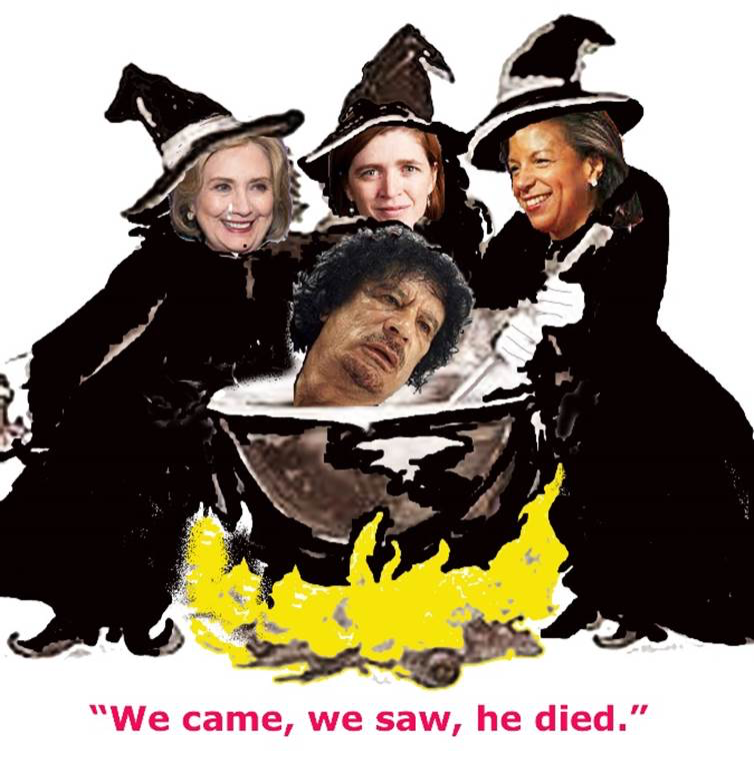
Three Powerful American Women—Hillary Clinton, Samantha Power and Susan Rice—Pushed Obama into Destroying the Wealthiest, Healthiest and Happiest Nation in Africa
On this day ten years ago, the Obama administration launched air strikes over Libya under the banner of the North Atlantic Treaty Organization (NATO), which culminated in the killing of Libya’s long-time ruler Muammar Qaddafi on October 21, 2011.
The bombing was presented to the public as a moral imperative that was necessary to stop imminent massacres and genocide by Qaddafi who had cracked down violently on allegedly pro-democracy protesters inspired by the Arab Spring.
Speaking from Brasilia on March 19, 2011, President Barack Obama stated that “the use of force is not our first choice. It is not a choice I make lightly. But we cannot stand idly by when a tyrant tells his own people that there will be no mercy.”
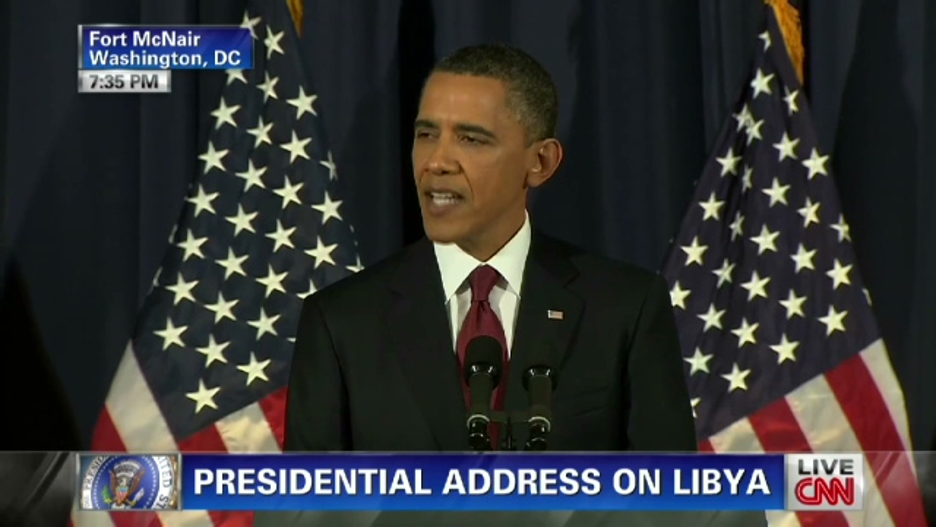
A decade later, Obama’s words ring incredibly hollow.
Libya has descended into years of civil war and anarchy in the aftermath of the U.S. and NATO bombing, which killed hundreds of people.
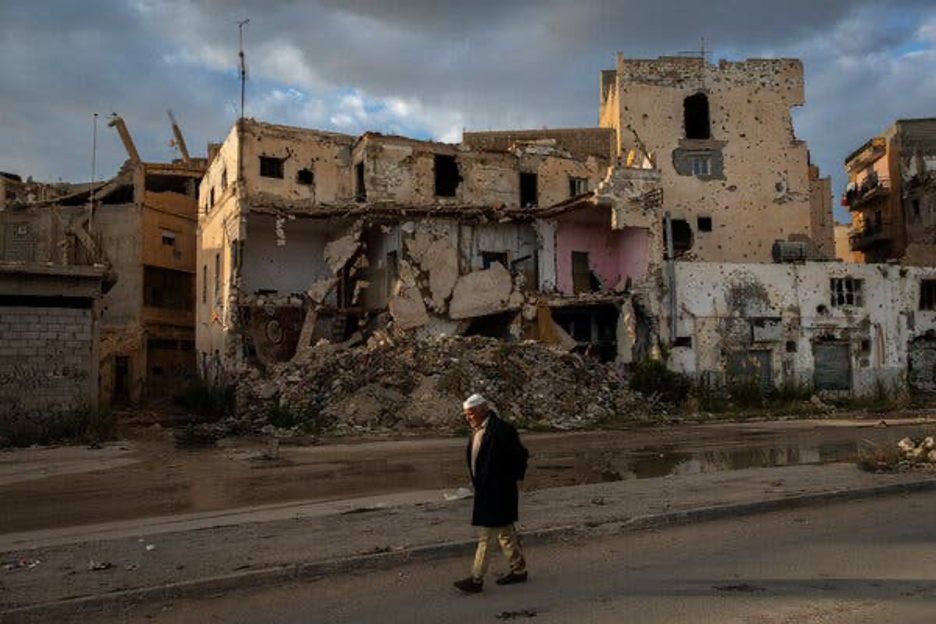
The percentage of the population that has access to electricity and quality education and health care has declined precipitously from the period of Qaddafi’s rule (1969-2011).
Only four of 97 hospitals in the country currently function and 260,000 students have been deprived of education.
Oil production—the lifeline of Libya’s economy—fell dramatically after the U.S.-NATO invasion, and in some places, gasoline can only be obtained on the black-market.
Tens of thousands of Libyans have risked their lives undertaking a harrowing journey across the Mediterranean trying to escape the ravages of their homeland which has seen the reintroduction of slavery.
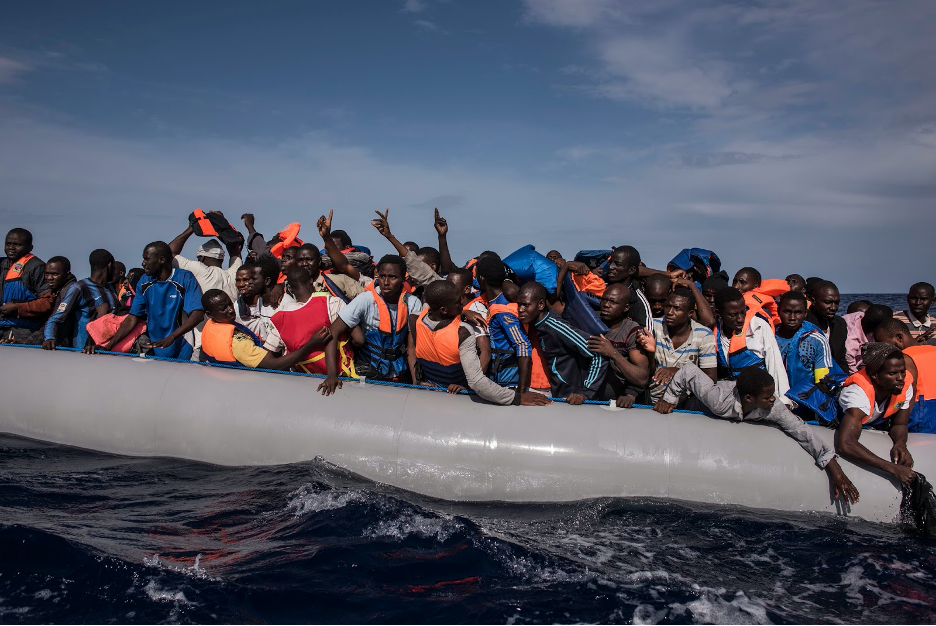
Human Rights Watch’s 2020 report paints a devastating indictment of the post-Qaddafi government which has used heavy weapons to suppress demonstrations against corruption and poor living standards, sanctioned massive human rights violations by allied militia fighters including the indiscriminate shelling of residential neighborhoods, and detained and mistreated thousands of migrants who were intercepted at sea.[1]
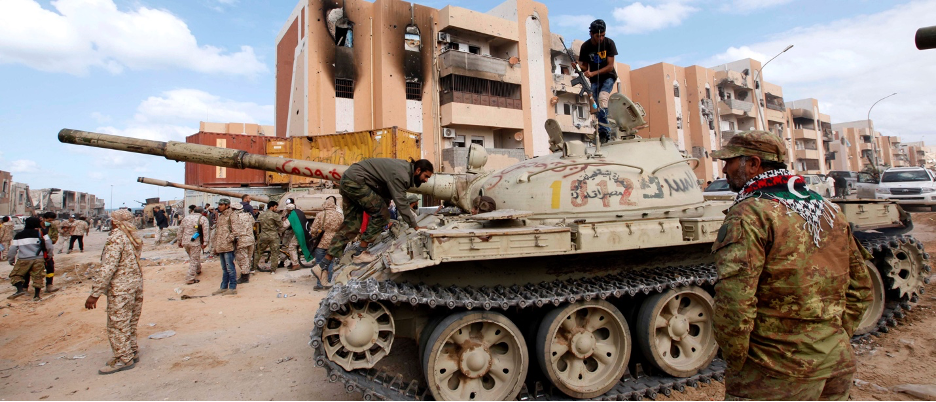
One of the dominant warlords, Khalifa Hiftar, was a longtime CIA asset who had led Libya’s invasion of Chad in the 1980s before defecting from Qaddafi’s regime.
According to Human Rights Watch, Hiftar’s forces have used banned cluster munitions in their drive for control of Libya while planting land mines and booby traps in Tripoli’s southern suburbs.
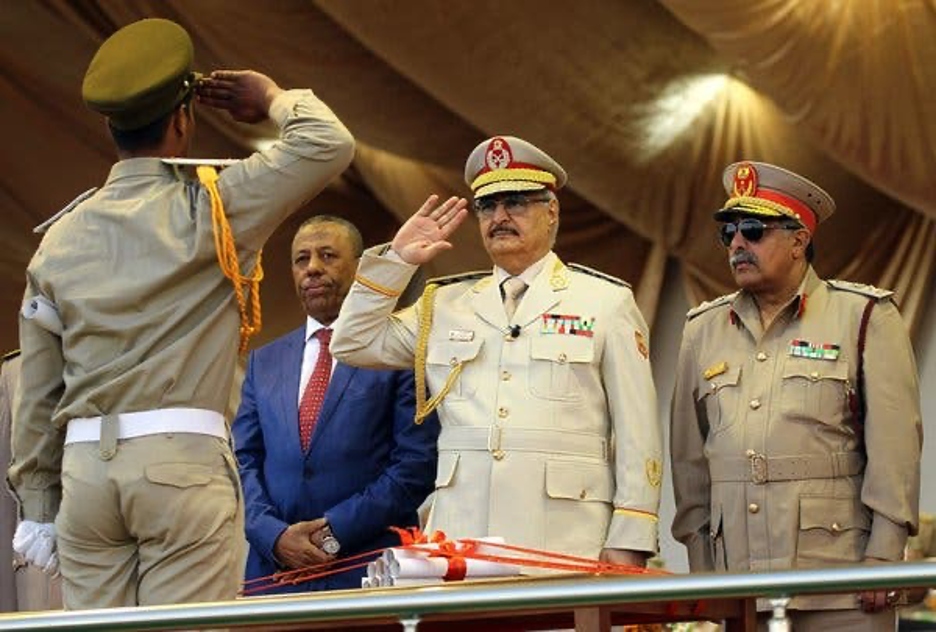
A confidential UN report detailed how Blackwater founder, Erik Prince, who has close ties to U.S. intelligence, coordinated an $80 million operation backed by the Trump administration, which supplied arms and mercenaries to Hiftar illegally and planned to form a hit squad to track and kill Libyan commanders opposed to him.[2]
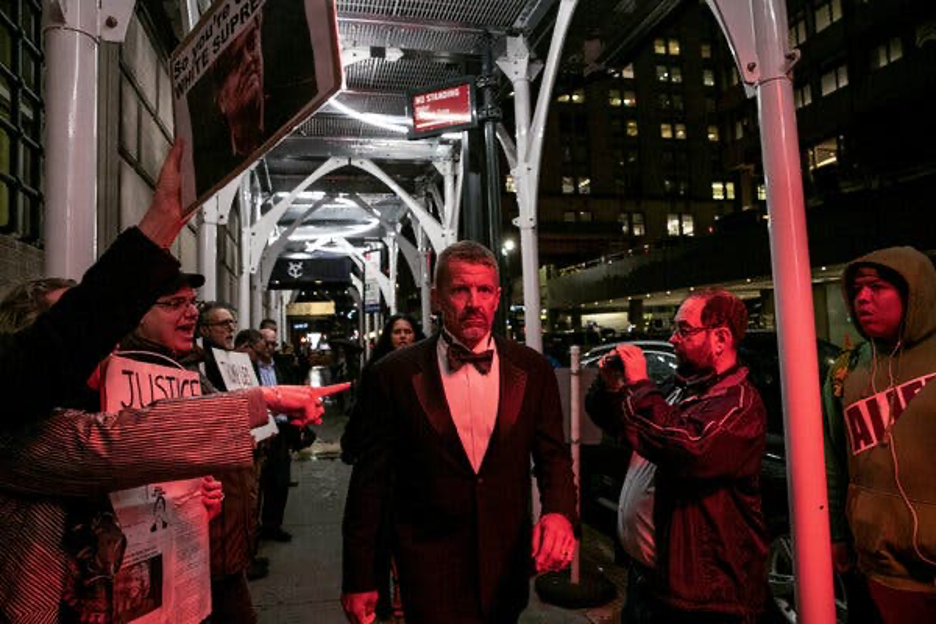
In September 2020, two families brought lawsuits in the U.S. against Hiftar, accusing his forces of atrocities during a months-long siege of Ganfouda in Benghazi in 2017. Two previous lawsuits against Hiftar accused him of sanctioning extrajudicial killings and torture.[3]
Libya’s most recently appointed Prime Minister, Abdul Hamid Dbeiba was meanwhile alleged to be involved in corruption, money laundering, financing of the Muslim Brotherhood, and vote buying. According to Tarek Megerisi of the European Council on Foreign Relations, his “family name leaves a bad taste in Libyans mouths.”
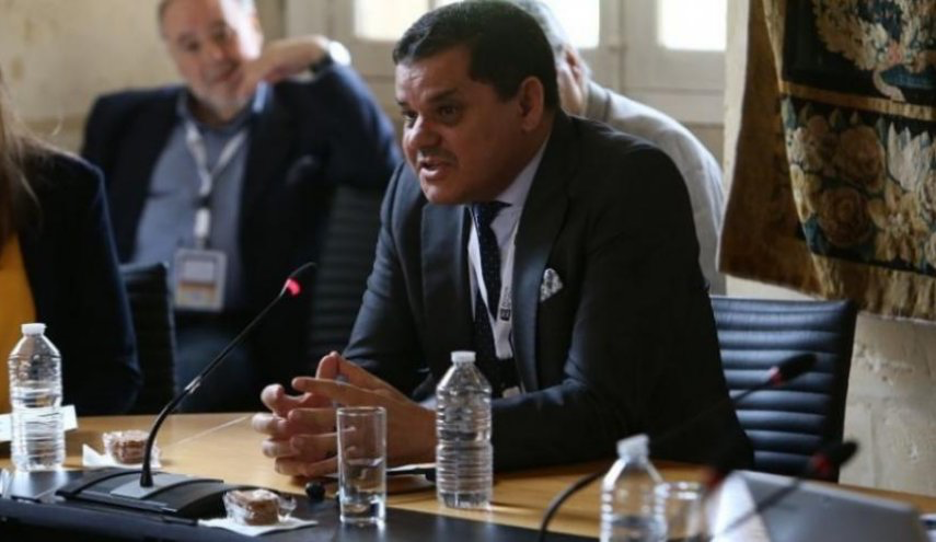
Media Disinformation
In the weeks leading up to the U.S.-NATO bombing, the U.S. media were filled with sensationalistic articles demonizing Qaddafi in the manner of Saddam Hussein on the eve of the 2003 Iraq War.
Characteristic was a report by ABC News correspondent Martha Raddatz on February 22, 2011, in which she proclaimed that “Gadhafi’s brutal side has emerged once again. This time, flying in cargo planes full of African mercenaries, who don’t even speak the language, to do his dirty work. Trained killers gunning down residents and protesters in cold blood.”
It was the CIA and rebel coalition that were the ones employing foreign mercenaries, however; Arab jihadists who committed atrocities that were blamed on Qaddafi.
Human Rights Watch would later count about 350 protesters killed before the U.S.-NATO intervention—not the thousands described in many media accounts.
A number of journalists repeated unfounded claims by Susan Rice, the U.S. Ambassador to the UN, that Qaddafi had supplied his soldiers with Viagra in order to carry out mass rapes.
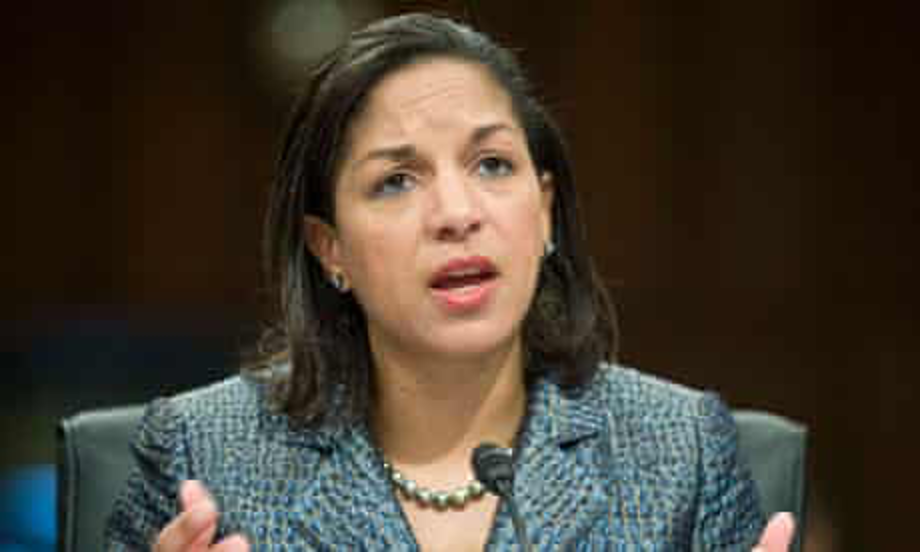
That the protest movement against Qaddafi was backed by Western interests was evident in slogans that read: “NATO Air: Just Do It.”
The media, echoing the State Department and Pentagon line, however, depicted the anti-Qaddafi protesters as “heroic”—to quote from the liberal New Yorker magazine—spotlighting hip youth participants who spoke about democracy.
Left out was the fact that Benghazi, where the protests began, was a bastion of Islamic fundamentalism.
YouTube videos showed demonstrators—some of whom waved the flag of Libya’s pre-revolutionary monarchy—chanting “Muammar is the enemy of Allah” and other Islamist slogans, and one was observed cutting the throat of a Qaddafi supporter and severing his head.[4]
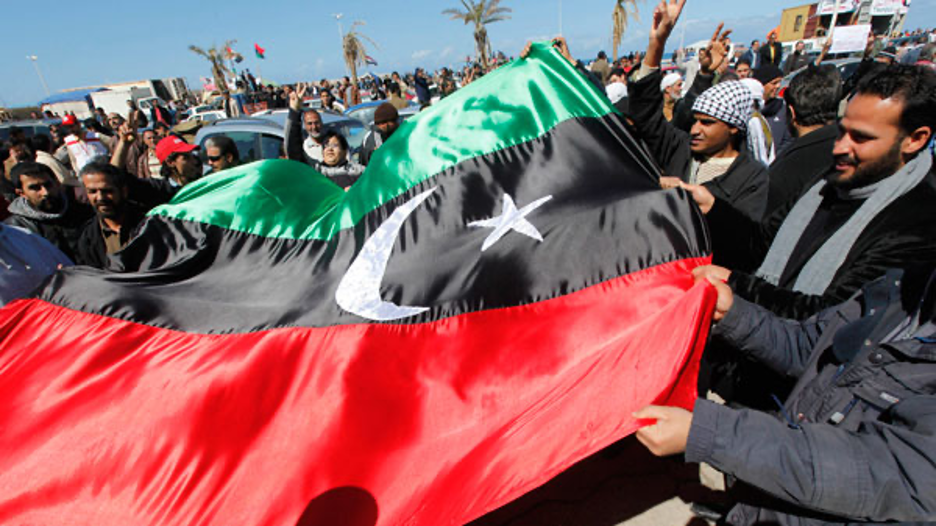
On the day of the bombing attack, CNN aired an interview by Don Lemon, then a rising young star on the network, with Mohammed Nabbous, who was depicted as a hero for risking his life to present the truth about Qaddafi’s brutality to the world.
Nabbous had set up a TV network, Al-Hurra, in Benghazi that received USAID and USIA funding, and was killed by a sniper hours before the bombing commenced.

His case was used to convey the impression of a good versus evil struggle, though African media presented the war more accurately as a neocolonial one.
The Lady Hawks
The most gung-ho proponents of the war in the U.S. were liberal feminists such as U.S. Ambassador to the UN Susan Rice, Secretary of State Hillary Clinton, and National Security Council adviser Samantha Power, who urged Obama to “man up against the crazy Qaddafi.”
Most of the men in Obama’s inner-circle, including CIA Director John Brennan and Secretary of Defense Robert Gates, were more reluctant warriors.
“How odd,” wrote New York Times columnist Maureen Dowd, to “see the diplomats as hawks and the military as doves,” and to “see Rush Limbaugh [conservative radio host] and Samantha Power on the same side.”

Rice, Clinton and Power had all come of age politically in the 1990s and claimed to harbor regrets that they did not do more to promote intervention to halt genocides in Bosnia and Rwanda.
When the African Union (AU) came up with a peace agreement that would allow Qaddafi to step down and set up elections, Power claimed that the AU was “acting foolishly.”[5]
According to the New York Times, Obama told aides to draft up military plans after a meeting in which Susan Rice told him that it was possible to get a resolution to the UN Security Council that would authorize the ability to bomb the Libyan government tanks on the road to Benghazi, the rebel stronghold.
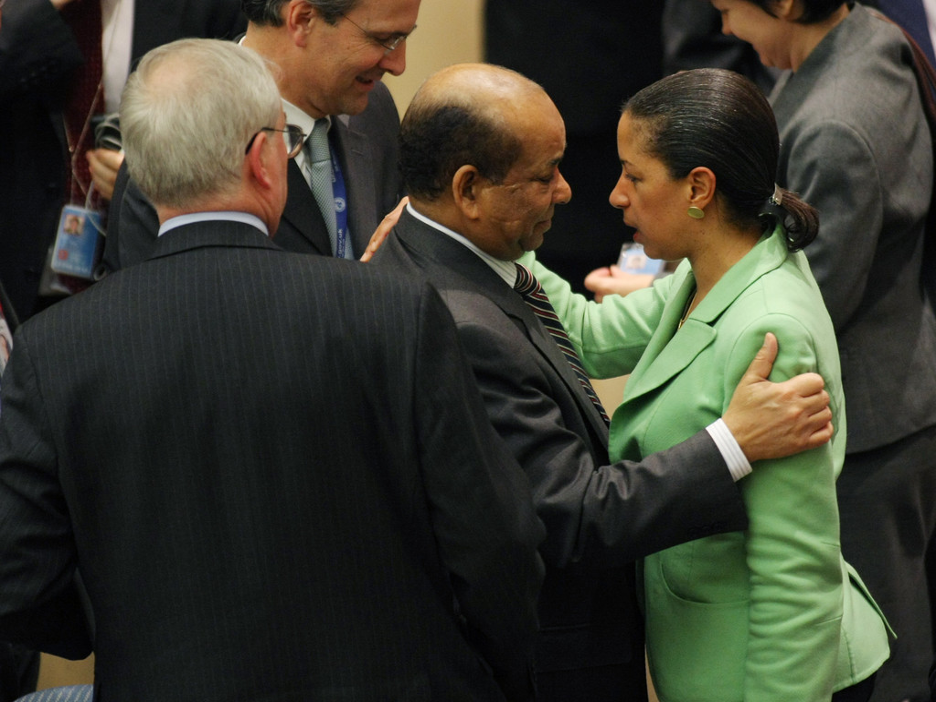
The Washington Post reported that yet another administration woman, Gayle Smith, Obama’s special assistant, joined Ben Rhodes and the troika of other women to push for war.
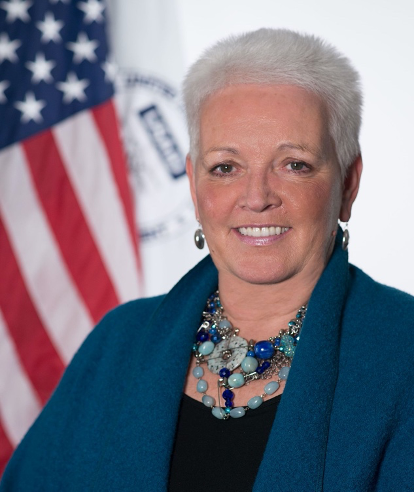
Brian Katulis, of the Center for American Progress, stated that “Hillary and Susan Rice were key parts of this story because Hillary got the Arab buy-in and Susan worked the U.N. to get a 10-to-5 vote, which is no easy thing.” These efforts “put the United States in a much stronger position because [it gave them] the international support that ma[de] th[e war] more like the 1991 Gulf War than the 2003 Iraq War.”

In her 2014 memoir Hard Choices, Clinton claimed that the Libyan rebels captured Tripoli “by late summer 2011,” without mentioning the U.S. or NATO’s actions.
At that point in the Libyan war, the NATO bombardment of Libya had expanded massively, beyond the declared mission of “protecting civilians” as required by the UN resolution.
Kucinich Calls for Obama’s Impeachment
After the bombing commenced, Dennis Kucinich (D-OH) called for Obama’s impeachment because Obama never obtained authorization for bombing from Congress in violation of the 1973 War Powers Act.
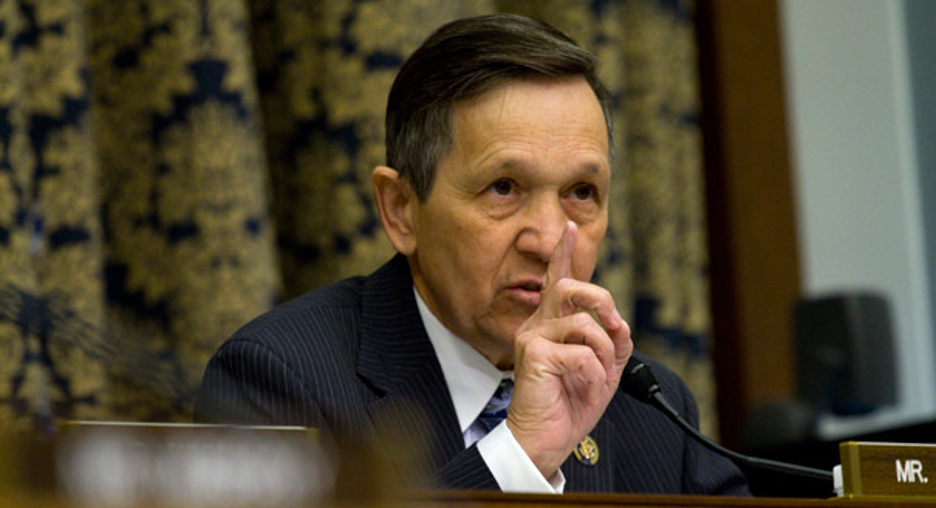
Senator Rand Paul (R-KY) took to the Senate floor to broadcast a quote from Obama in the Boston Globe four years earlier when he had said “the president does not have power under the Constitution to unilaterally authorize a military attack in a situation that does not involve stopping an actual or imminent threat to the nation.”[6]
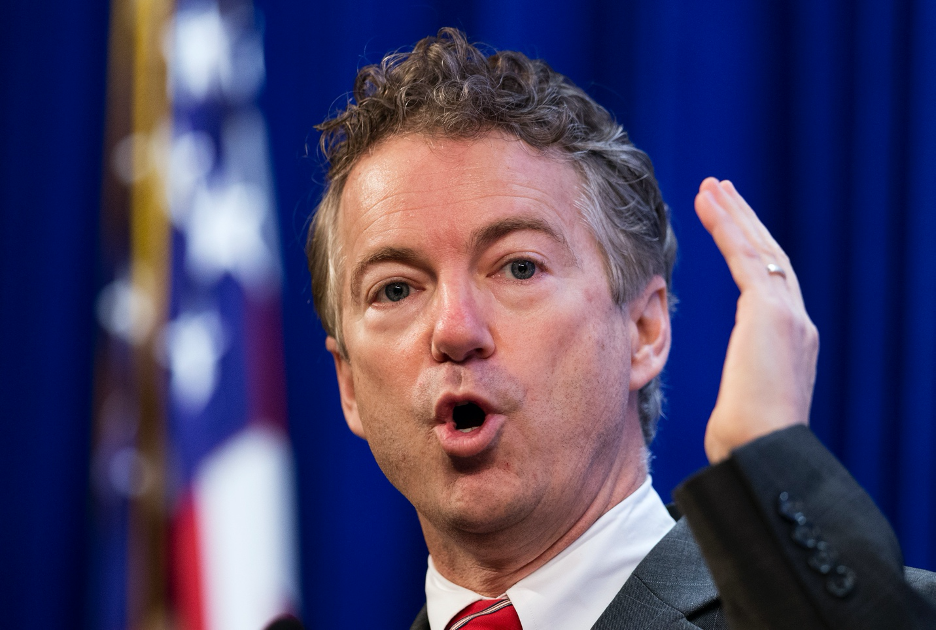
The House of Representatives, by a 268-145 vote, passed a resolution asserting that the president had failed to provide a compelling rationale for bombing.
Targeting a Long-Time Foil of the American Empire
The regime change operation targeting Qaddafi had been years in the making.
Born to a poor family in Sirte which fought against Italian colonial rule, Qaddafi first came to power in a bloodless 1969 revolution against the Sanussi King Idris, a corrupt U.S. and British ally who gave concessions to Western oil companies in return for military and technical aid.[7]
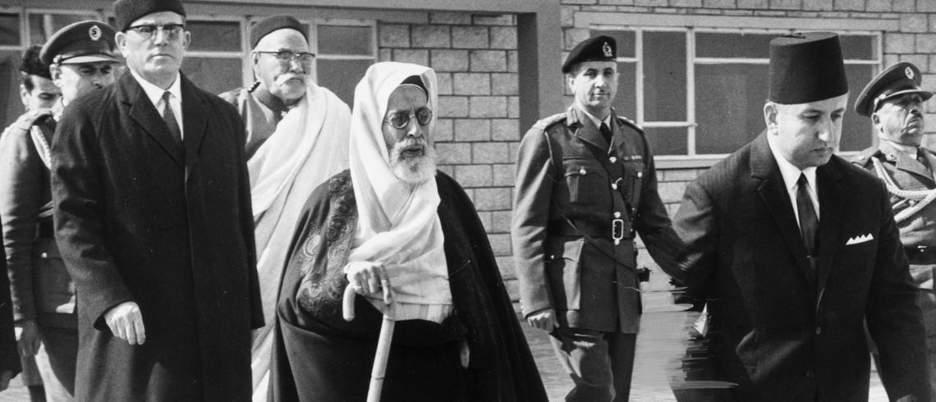
King Idris also allowed a large U.S. military base at Wheelus, near Tripoli, along with rights to a naval port, air and ammunition storage facility at Tabruk, a guided-missile range in Tripoli, a communications site at Derna, and a radar station and airfield at Benghazi and Cape Misrata.
A Pan-Arab and African supportive of the Palestinian cause, Qaddafi kicked out the U.S. military when he came to power in 1969 and placed Libya’s high-quality light sweet crude oil under national control, reinvesting profits in health and education.
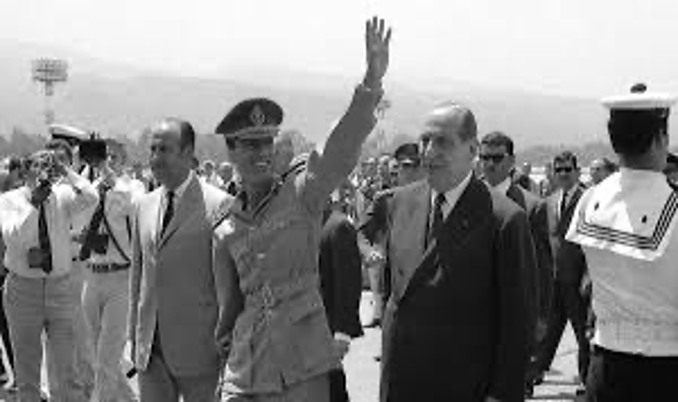
Life expectancy increased from 54 to 71 years under his rule, the literacy rate went from 6 to 88 percent, and homelessness was eliminated.[8]
Through its state-owned bank which did not charge interest, Libya also financed an African satellite that slashed communications costs and became a world leader in hydraulic engineering due to development of a man-made river that won a major UNESCO award for “remarkable scientific research on water usage in arid areas.”[9]
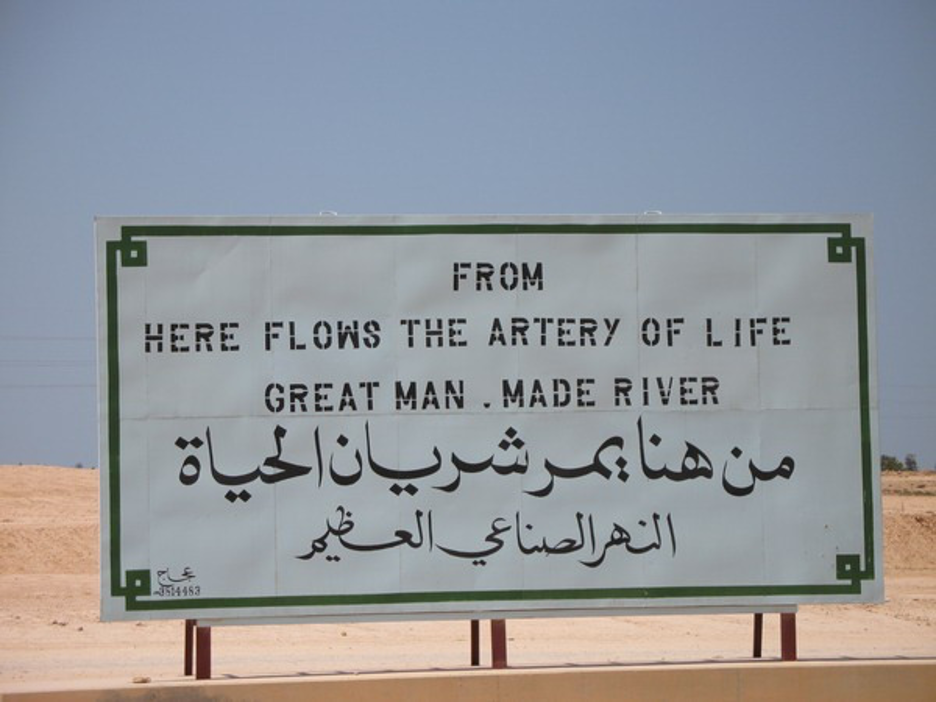
The late South African journalist Ruth First wrote a book entitled Libya: The Elusive Revolution, which emphasized Qaddafi’s top-down approach to government, although many felt a sense of participation in decision-making afforded through local councils and Qaddafi’s Green Book promoted a system of direct democracy.
Tribal conflict was averted through power-sharing and women’s rights were advanced.[10]
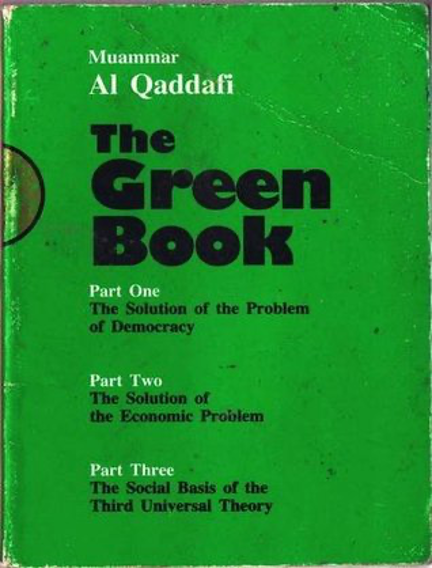
The New York Times, which was always highly critical of Colonel Qaddafi, conceded that, in Libya, the intention was that “everyone is involved in every decision … Tens of thousands of people take part in local committee meetings to discuss issues and vote on everything from foreign treaties to building schools.”[11]
A UN report, issued ironically during the U.S.-NATO bombing, praised Qaddafi’s human rights achievements, which included the bettering of “legal protections” for citizens, improving women’s rights, educational opportunities and access to housing.
The Nixon administration had first considered assassinating Qaddafi right after he came to power. President Ronald Reagan then undertook another assassination attempt in 1986 based on dubious pretexts—an attack which left up to 100 civilians dead including Qaddafi’s fifteen-month old adopted daughter.[12]
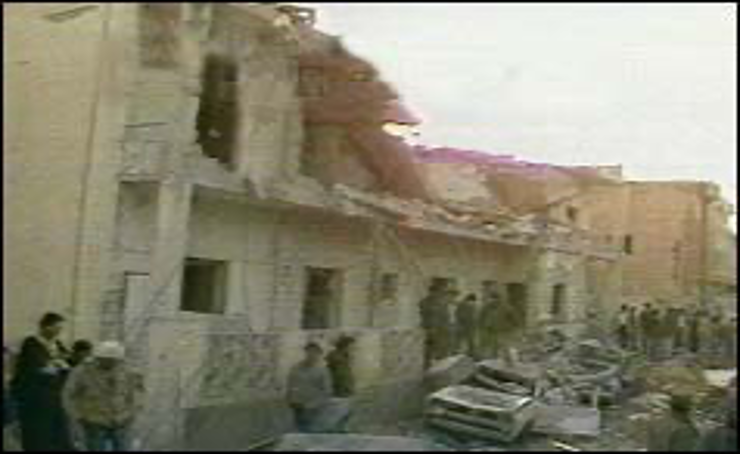
A leaked memorandum by National Security Advisor, Admiral John Poindexter, called for a disinformation campaign and regime change strategy, which was reinvigorated in 2011.[13]
Qaddafi had ironically cooperated with the U.S. in the Global War on Terror, in part because the main opposition to his regime came from Islamists.
When Obama was elected president, Qaddafi wrote him a letter in which he addressed him as “my son” and stated. “I have said to you before that even if Libya and the United States enter into war, God forbid, you will always remain my son, and I have all the love for you as a son, and I do not want your image to change with me.”
Qaddafi continued: “We are confronting Al Qaeda in the Islamic Maghreb, nothing more. What would you do if you found them controlling American cities with the power of weapons? Tell me how would you behave, so that I could follow your example?”
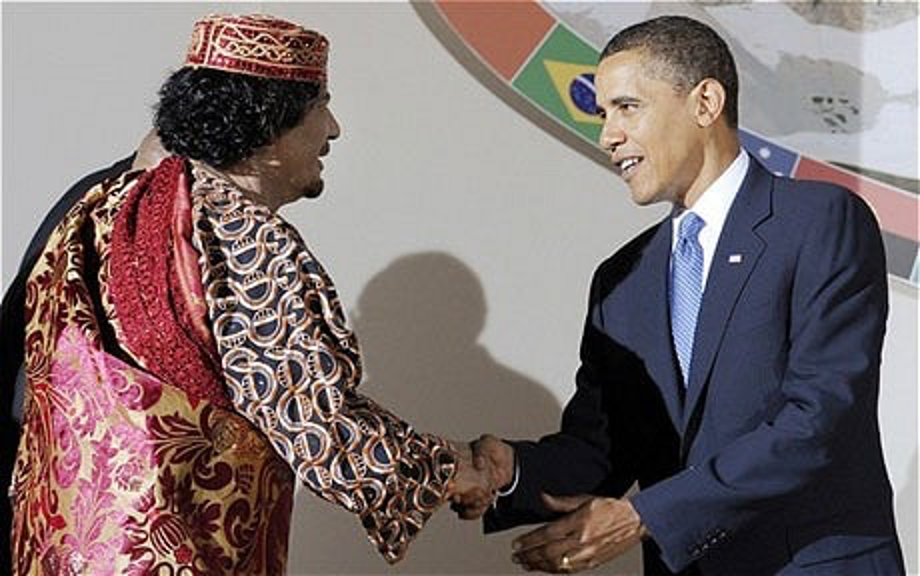
Obama’s betrayal was set in motion by a speech that Qaddafi gave before the UN General Assembly in September 2009 where he juxtaposed praise for Obama with demand for the return of $777 trillion that had been stolen from Africa by the colonial powers.
In the same speech, Qaddafi called for investigation into the assassination of Patrice Lumumba, UN Secretary General Dag Hammarskjöld, John F. Kennedy and Martin Luther King Jr.[14]
Picking up the mantle of Ghanaian leader Kwame Nkrumah, Qaddafi at the time was promoting a Central African Court, and a Monetary Fund and Bank capable of lessening African dependence on Western financial institutions.
He was planning to re-nationalize significant parts of the oil sector, had spurned a building contract with Bechtel, a San Francisco-based construction giant which builds military bases, and had initiated 50 major economic projects with China.
Further, Qaddafi was beginning efforts to initiate a new currency with Libya’s vast gold and silver holdings that could undercut the French franc and U.S. dollar, and refused to cooperate with the U.S. military’s Africa command (AFRICOM), stating that he preferred it to remain headquartered in Europe.[15]
Following the outbreak of the rebellion in February 2011, Saif al-Islam Qaddafi, Muammar’s son, told Libyans that those cajoling the protesters “were Libyans who lived in Europe and USA, whose children went to school there and who were comfortable and want [now] to come and rule us and Libya. They want us to kill each other then come, like in Iraq.”
Saif emphasized that Libya was different from Tunisia or Egypt, that “if there was disturbance, it will split several states. It was three states before 60 years ago. Libya are Tribes not like Egypt. There are no political parties, it is made of tribes. We will have a civil war like in 1936. American oil companies played a big part in unifying Libya. Who will [if Qaddafi is removed] manage this oil? How will we divide this oil amongst us? Who will spend on our hospitals? All this oil will be burnt by the Baltagiya (thugs), they will burn it.”
“A civil war would also disrupt the $200 billion in development projects currently underway.” Three quarters of our people, Saif said “live in the East in Benghazi, there is no oil there, who will spend on them? Your children will not go to schools or universities. There will be chaos.”[16]
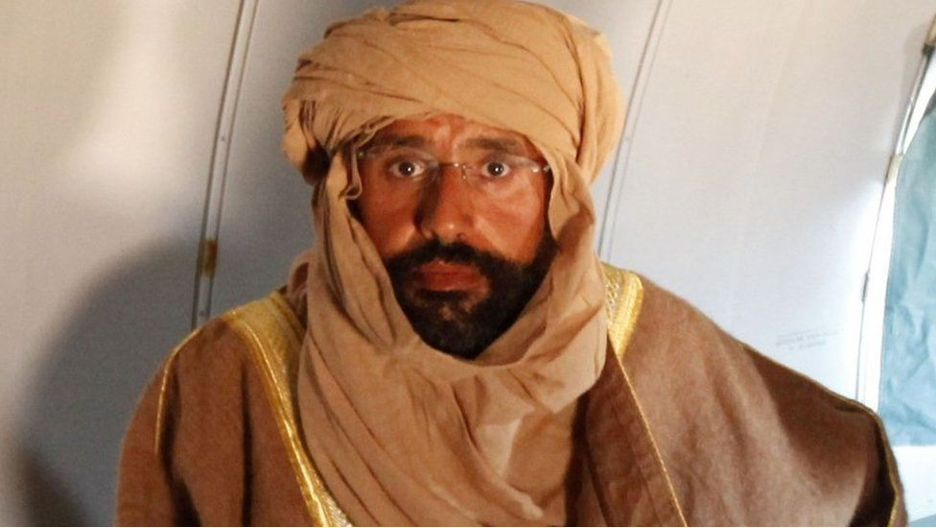
Saif’s analysis proved to be prescient as Libya was indeed thrust into civil war and chaos as well as destitution by the U.S.-NATO invasion.
False Pretexts: The Abu Salim Massacre
The revolt in Benghazi—a trigger for national protests against Qaddafi—was initiated by families of the victims of the Abu Salim massacre in February 2011 after Qaddafi arrested a lawyer, Fathi Terbil, who had demanded a public inquiry.
During the Abu Salim massacre, prison guards opened fire on rebellious Islamist prisoners at the Abu Salim prison near Tripoli in June 1996, killing an unknown number.
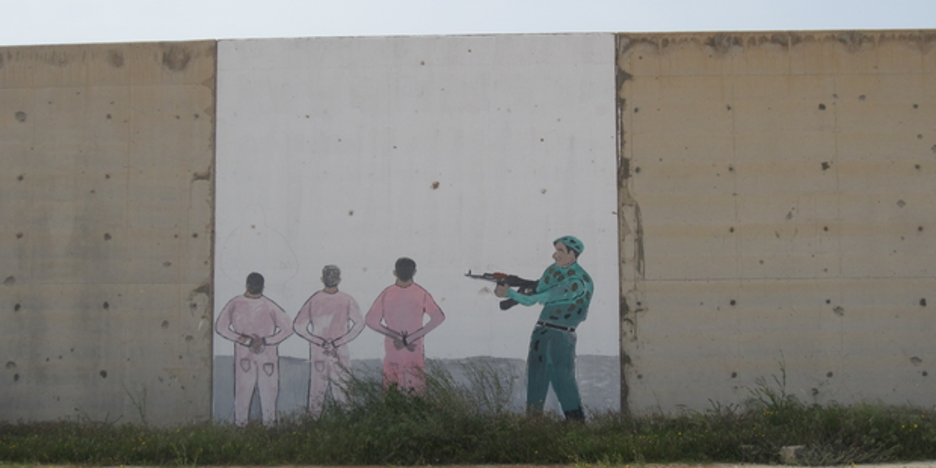
The facts surrounding this incident, including the number of deaths, remain murky and there is no evidence that Colonel Qaddafi himself gave any orders to execute prisoners.
After Qaddafi’s ouster, the new governing council claimed to have unearthed mass graves to confirm that more than 1,200 people died but these were actually filled with animal bones.[17]
Barack Obama in a speech before the U.S. Army War College nine days after authorizing air strikes on Libya, claimed that “we had seen Qaddafi hang civilians in the streets and kill over a thousand people in a single day.”[18]
The latter was a veiled reference to the Abu Salim massacre which has never been confirmed or linked to Qaddafi.
Obama in his War College speech stated further as a pretext for bombing the need to protect civilians in Benghazi from a massacre by Qaddafi’s forces.
However, Qaddafi had not perpetrated any bloodbaths in any of the cities his forces had recaptured and Libyan tanks on the road to Benghazi were bombed not when they were advancing but during their retreat.[19]
The London Daily Telegraph reported that a bloodbath took place when the Sanussi (anti-Qaddafi) rebels took control of Benghazi, after which Al-Qaeda flags were seen flying over the courthouse.[20]
Operation Odyssey Dawn
The Obama administration spent about $1 billion on Libya’s “revolution” and helped NATO with everything from munitions to surveillance aircraft, carrying out roughly 20 percent of the over 26,000 bombing sorties in the seven-month Operation Odyssey Dawn.
U.S.-NATO jet bombers dropped cluster munitions, phosphorus and fuel-air explosives which are outlawed under international law.
In the opening hours of the campaign, the USS Florida launched 100 cruise missiles against Libyan air defenses, creating an entry corridor for the airstrikes that followed.
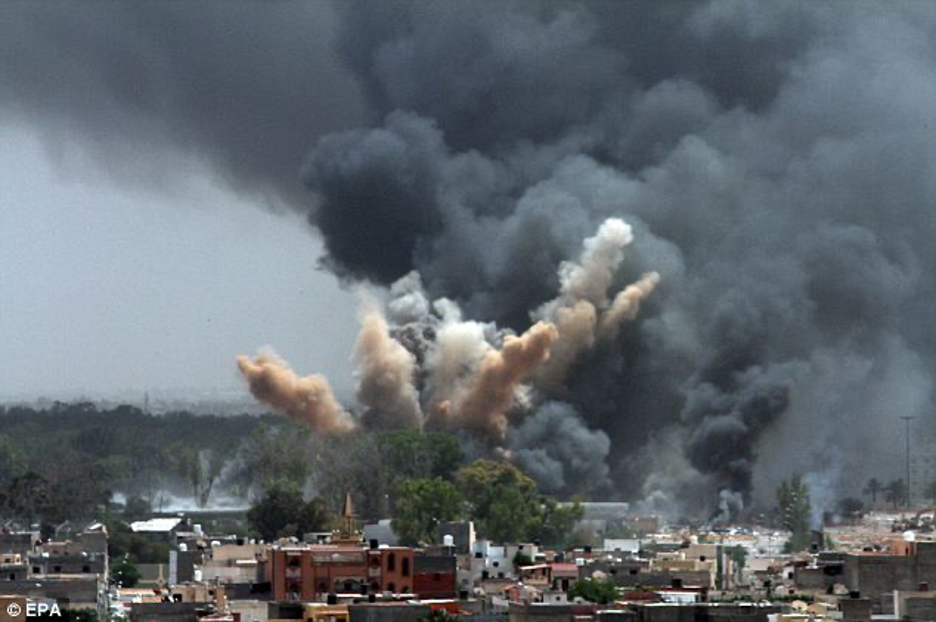
Predator drones flew overhead for hundreds of hours, chronicling the “patter of life below” to prepare target selection for B-2 stealth bombers and Hellfire and Tomahawk missiles with depleted uranium warheads.
Civilians only loosely linked to Qaddafi’s regime were targeted in the bombing. Buildings and homes were hit along with desalinization plants and the man-made river and water pipe infrastructure supplying over four million people.[21]
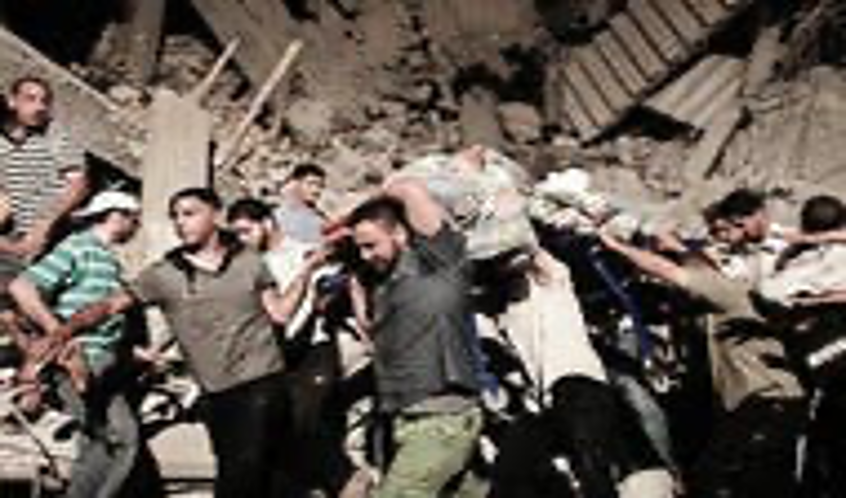
The town of Sirte, a Qaddafi stronghold envisioned as the center of a united Africa, was reduced to a “ghost town filled with the stench of death,” as one eyewitness described it.[22]
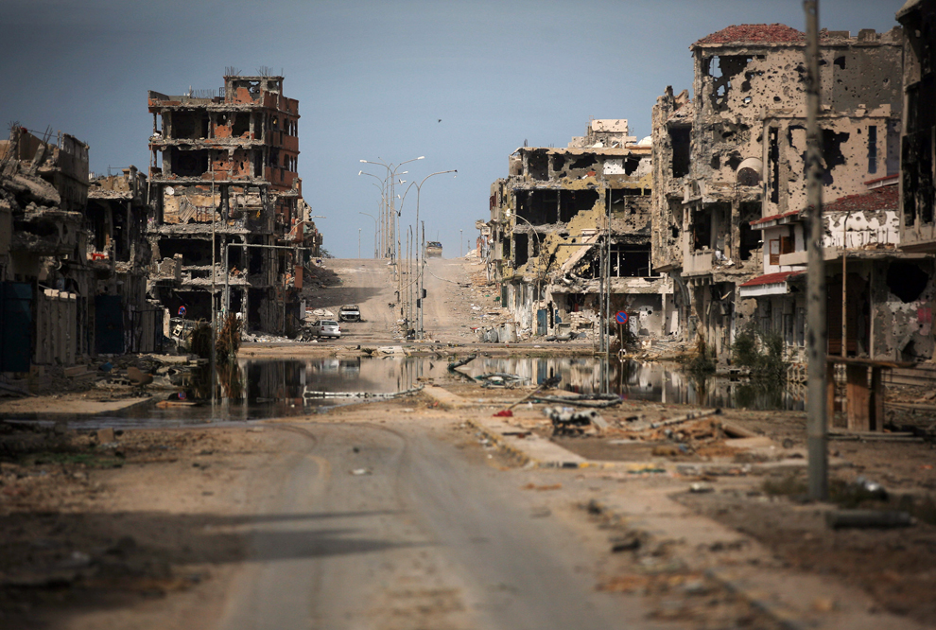
Qaddafi’s home was bombed in another illegal assassination attempt that killed his son and three of his grandsons.
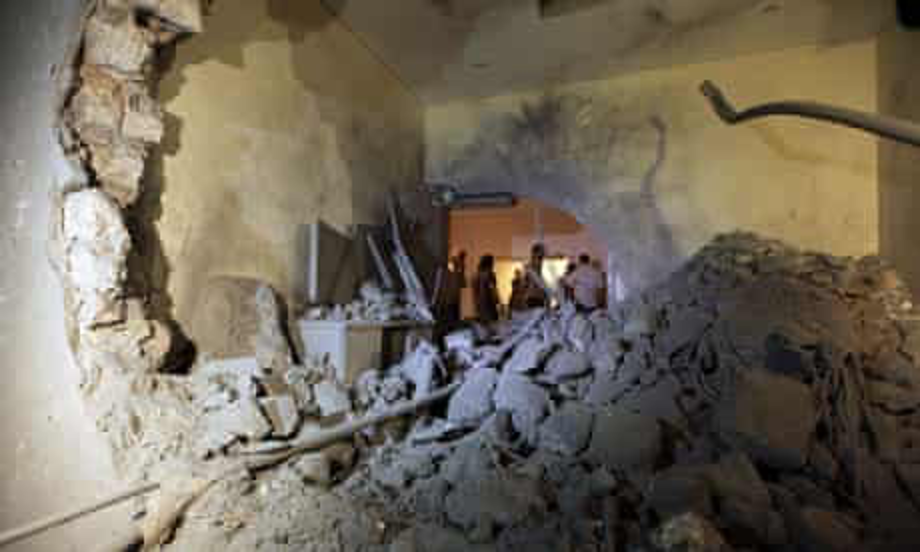
A major ethnic cleansing operation was also carried out by rebel forces in Misrata targeting pro-Qaddafi Blacks who had racial slurs painted on the walls of their abandoned homes.
Misrata resident Umm Bubakr told the BBC that. “They bombed and shot at us and we had to run away. I ran away with my kids. I’ve lost a boy and I don’t know whether he is alive or dead. And now we are here [refugee camp where militias would kidnap young men], with no future. We are scared, we need a solution to our problem, and we want to go home.”
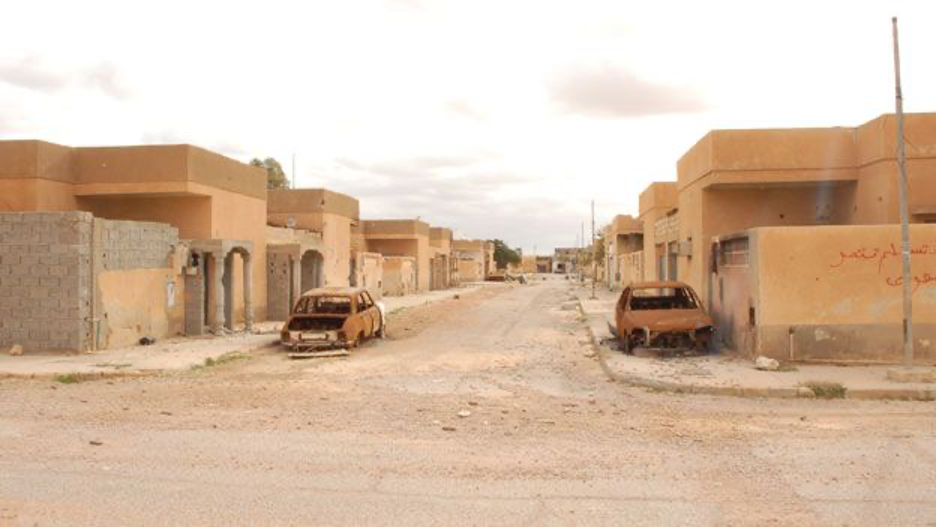
The final assault on Tripoli was led by Qatari Special Forces paid by the CIA and Pakistani ISI mercenaries.
When Qaddafi was found with the assistance of U.S. predator drones hiding in a sewer pipe, rebels tortured and sodomized him with a sharpened two-foot pole and then shot him in the head and displayed his body in a meat locker.
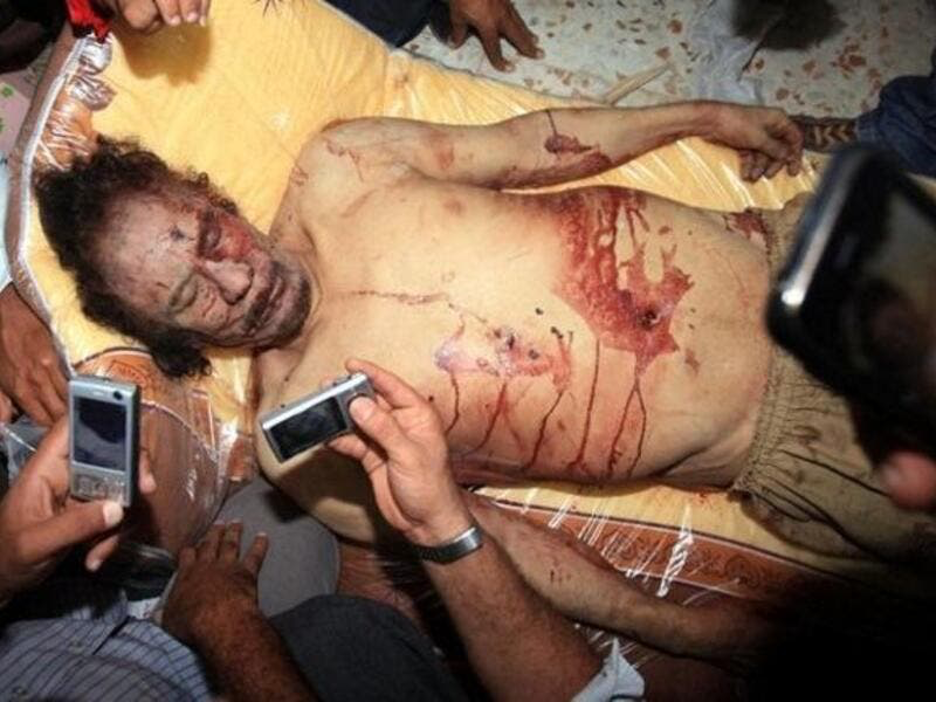
In an interview with ABC News, Hillary Clinton subsequently proclaimed: “We came, we saw, he died,” a twisted play on the words of Julius Caesar following his victory over the King of Bosporus at the Battle of Zela around 47 B.C.
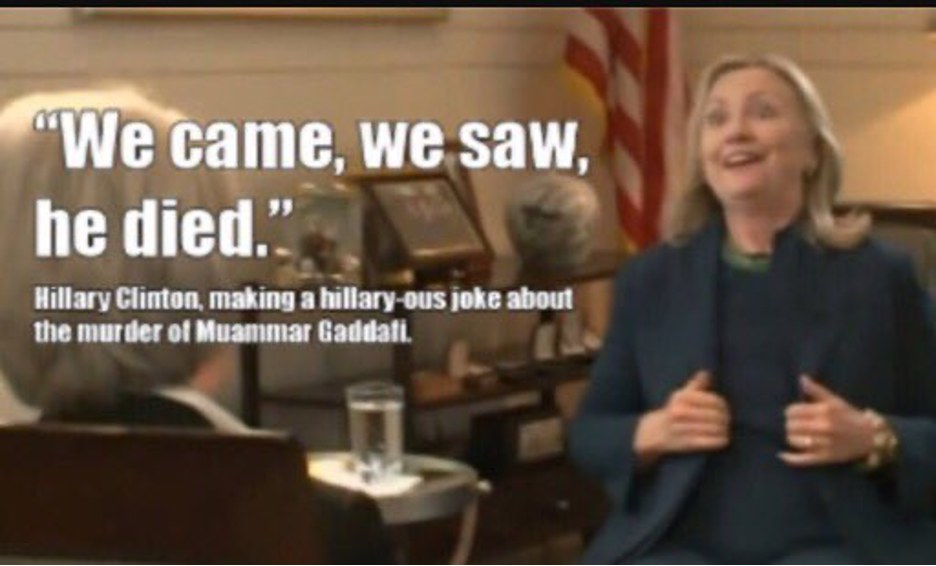
CIA Director John Brennan told speechwriter Ben Rhodes that Qaddafi’s death marked a “fitting end for one of the biggest rats of the 20th century.” No Western leader would ever be characterized in this way.
Aftermath
After Qaddafi was ousted, President Obama confiscated a whopping $30 billion from Libya’s Central Bank.
Having learned nothing from the ill-fated de-Baathification policy in Iraq—which created an insurgency by excluding former Baath party members from Iraq’s government—the Obama administration promoted a law barring anyone formally tied to the Qaddafi regime from holding office for ten years.
Supported by the Muslim Brotherhood, Libya’s first post “liberation” president, Mohammed Youssef el-Magariaf, had been expelled from Libya in 1980 when he was ambassador to India for stealing millions of dollars that had been earmarked for building a mosque.[23]
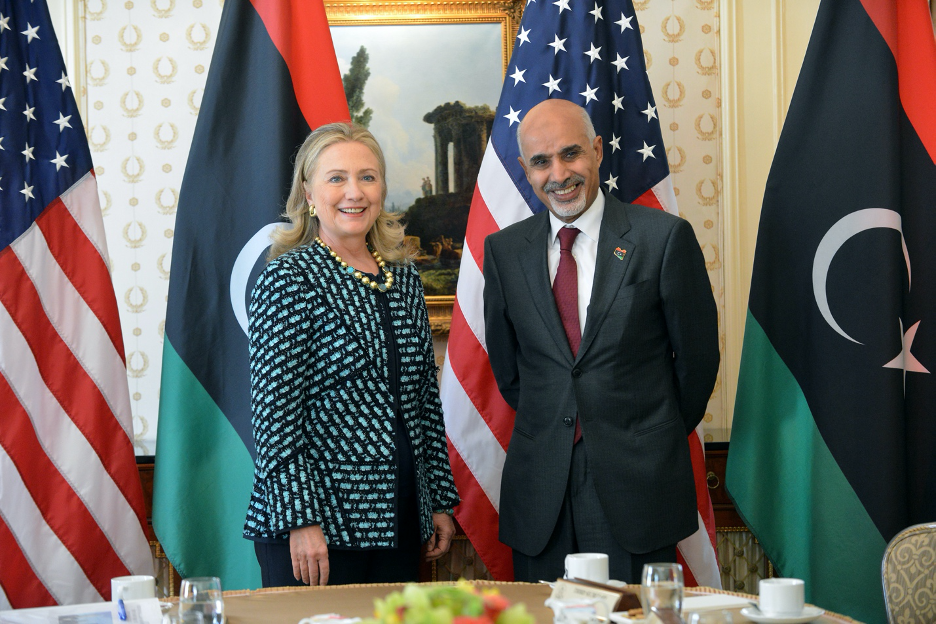
Prime Minister Mahmoud Jibril, a University of Pittsburgh Ph.D. in political science, had promoted privatization and economic liberalization measures while heading the National Planning Council prior to his defection from Qaddafi’s regime.
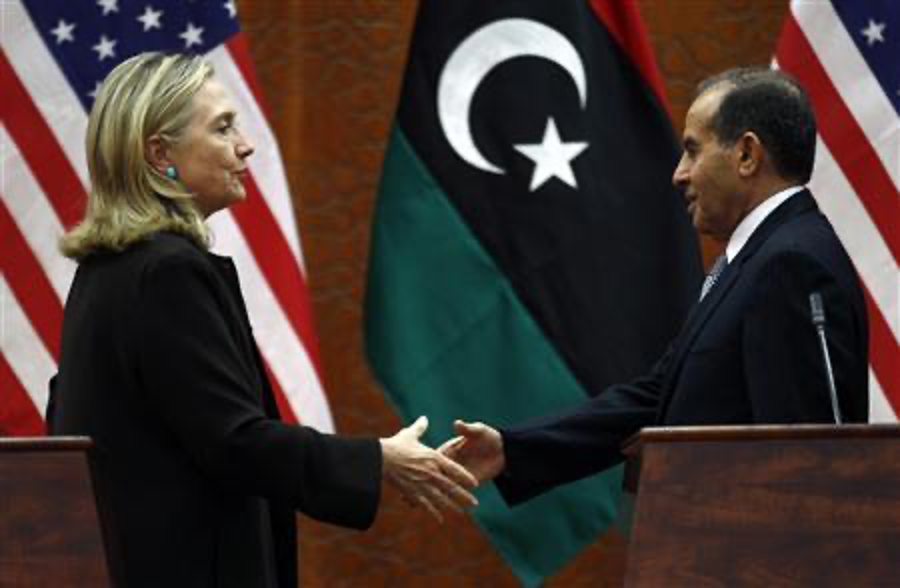
As civil war broke out, the U.S., according to Clare Lopez, a former CIA officer, switched sides in the War on Terror by facilitating the provision of weapons to known Al-Qaeda militias and figures, including through the United Arab Emirates.
These figures included Abdelhakim Belhadj, long-time leader of the Islamic insurgency against Qaddafi who oversaw pogroms against the black-skinned Tawherga.
Belhadj had previously met with Osama bin Laden, fought with the Taliban in Afghanistan and against the U.S. in Iraq, and helped plan a horrific March 2004 train bombing in Madrid.
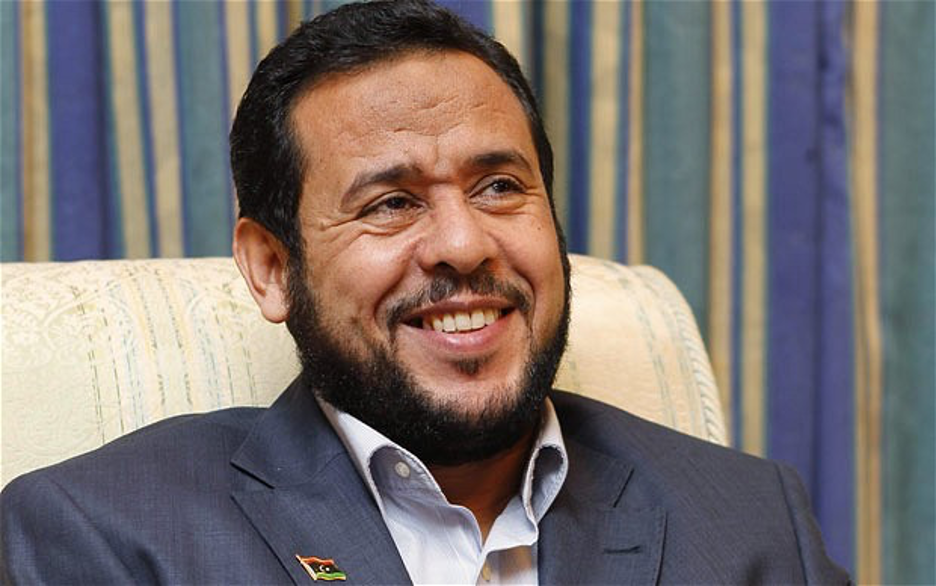
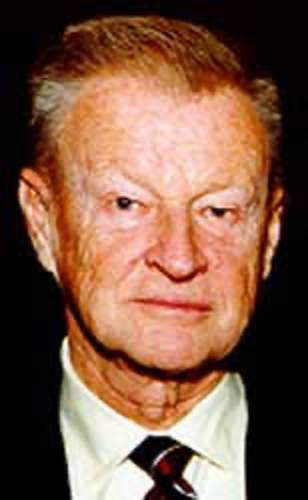
The U.S. alliance with jihadists against the secular left fit with a pattern dating to the Cold War where Jimmy Carter’s National Security Adviser, Zbigniew Brzezinski, and other Ivy League intellectuals envisioned an arc of Islam as a bulwark against Pan-Arab socialism.[24]
The new Grand Mufti of Libya following Qaddafi’s ouster, Sheikh Sadeq al-Ghariani, issued fatwas legitimizing polygamy and banning women from marrying foreigners and called on the Ministry of Education to delete passages on democracy and freedom of religion from textbooks.
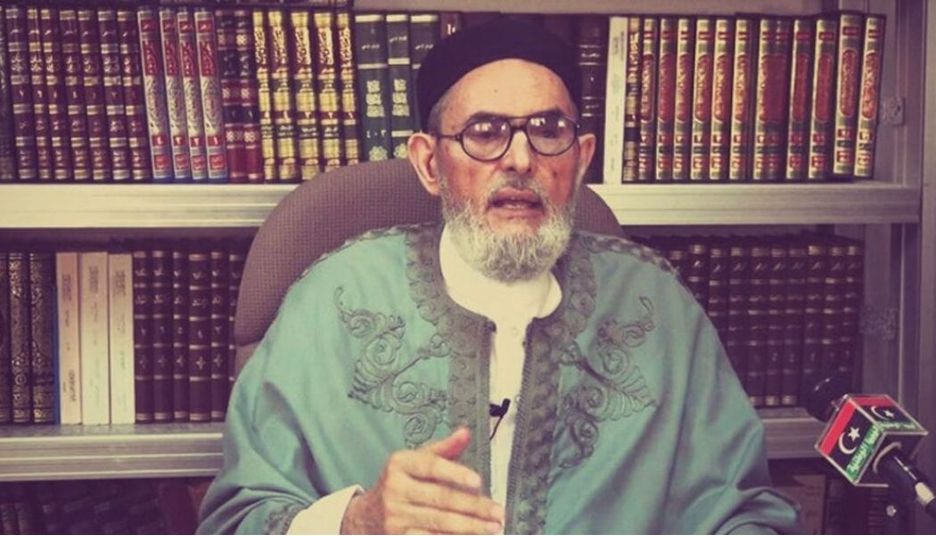
Libya’s great patriot Imam Sheikh Khaled Tantoush, who was against radical Islam, was meanwhile imprisoned and tortured in a Misrata jail for over five years.
In 2012, the Obama administration denied a request from Libyan tribal elders to cleanse the country of Islamic terrorists in return for the departure of U.S.-NATO soldiers.
The result was an atrocity-laden environment epitomized by incidents such as the February 2015 beheading by ISIS militants of 21 Egyptian oil workers on a beach near Tripoli, destruction and vandalism of Sufi shrines and mosques, assassination of former Qaddafi officials, and shooting of homosexuals.[25]
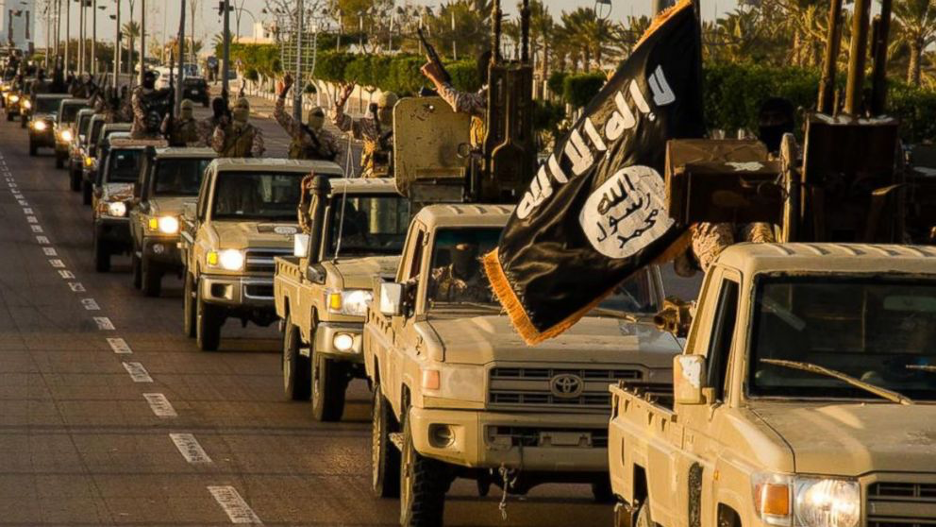
Blowback came with the killing of the U.S. ambassador Christopher Stevens, and three other embassy staffers by Islamic militants who had been empowered by the U.S.-NATO war.
A University of California graduate with a “talent for breaking bread with men in camouflage fatigues,” according to a profile in Vanity Fair, Stevens allegedly ran an illicit arms pipeline that provided 50,000 shoulder-fired rockets to jihadist rebels in Syria.
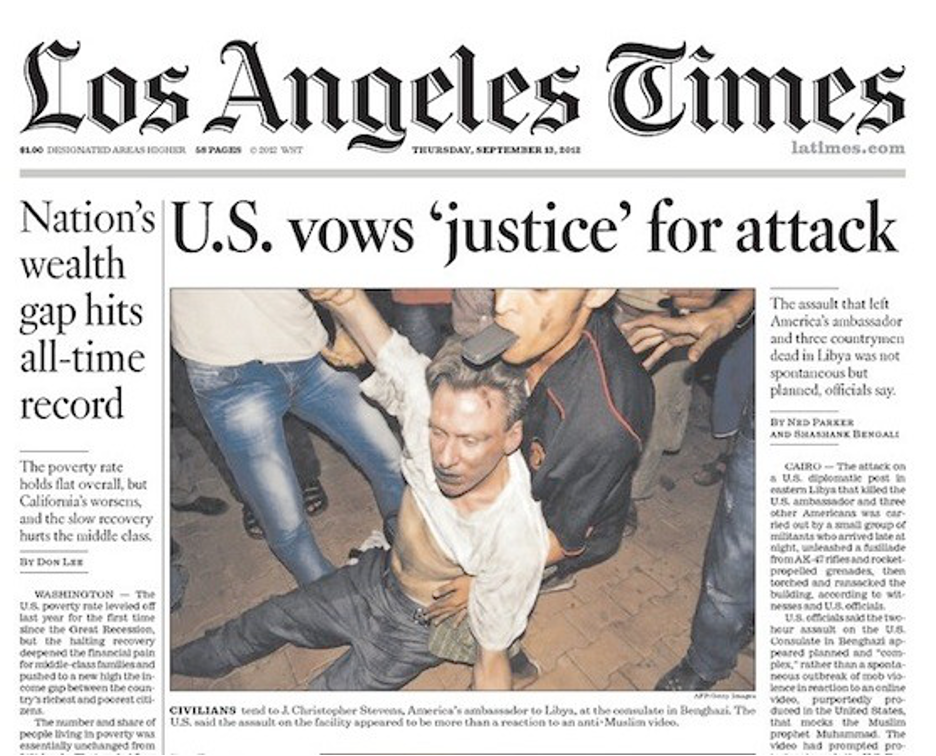
At the end of his presidency, Obama acknowledged the Libyan War to have been a “shit show,” though he cowardly tried to blame British Prime Minister David Cameron.
The scope of the calamity is almost immeasurable in human terms, with an estimated 600,000 Libyans killed and countless more displaced, as Libya has become a haven for illicit arms transfers and international terrorism.
Why No Large Antiwar Movement
As we come upon the ten-year anniversary of the Libyan War, it is important to ask why no larger U.S.-based antiwar movement ever developed.
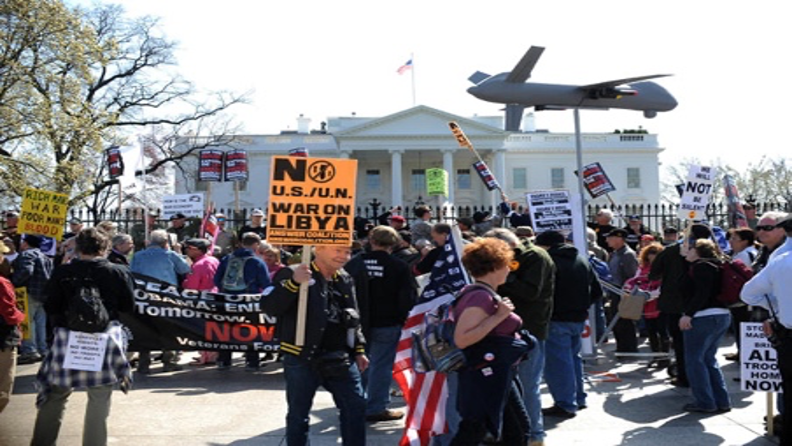
A main reason is partisan politics.
Many liberals who traditionally oppose wars abhorred the radicalization of the GOP and considered its attacks on President Obama to be rooted in racism, and so were prone to defend many of Obama’s policies.
The reliance on air power and the fact that no U.S. citizens died in the operation was also significant as was the media’s biased coverage and effective demonization of Qaddafi.
Progressives who might have opposed past wars did not want to identify with Qaddafi and were swayed by the idea that U.S. military force could help save the Libyan population from major massacres or genocide.
The alternative media, furthermore, framed the Libyan conflict in the same biased way as the mainstream media.
For example, on the day that the U.S.-NATO bombing commenced, the progressive outlet Democracy Now! aired an interview with Mohammed Nabbous, the anti-Qaddafi martyr interviewed also on CNN, whose news network was subsidized by U.S. government agencies.
In the preceding weeks, Democracy Now! ran a number of interviews by correspondent Anjali Kamat with anti-Qaddafi activists—many of whom sought foreign intervention.
The activists were presented heroically as champions of human rights, while Qaddafi was depicted as a murderous despot comparable to Egypt’s Hosni Mubarak and Tunisia’s Zine el Abadine Ben Ali who had been ousted in the Arab Spring.
Democracy Now! gave credence to allegations of black mercenaries, air raids by Qaddafi and other propaganda advanced by the State Department and rebel coalition, while failing to report on Qaddafi’s accomplishments and resistance to AFRICOM, and on the fact that the U.S., Britain and France had sent in military advisers to train anti-Qaddafi forces in advance of the bombing.[26]
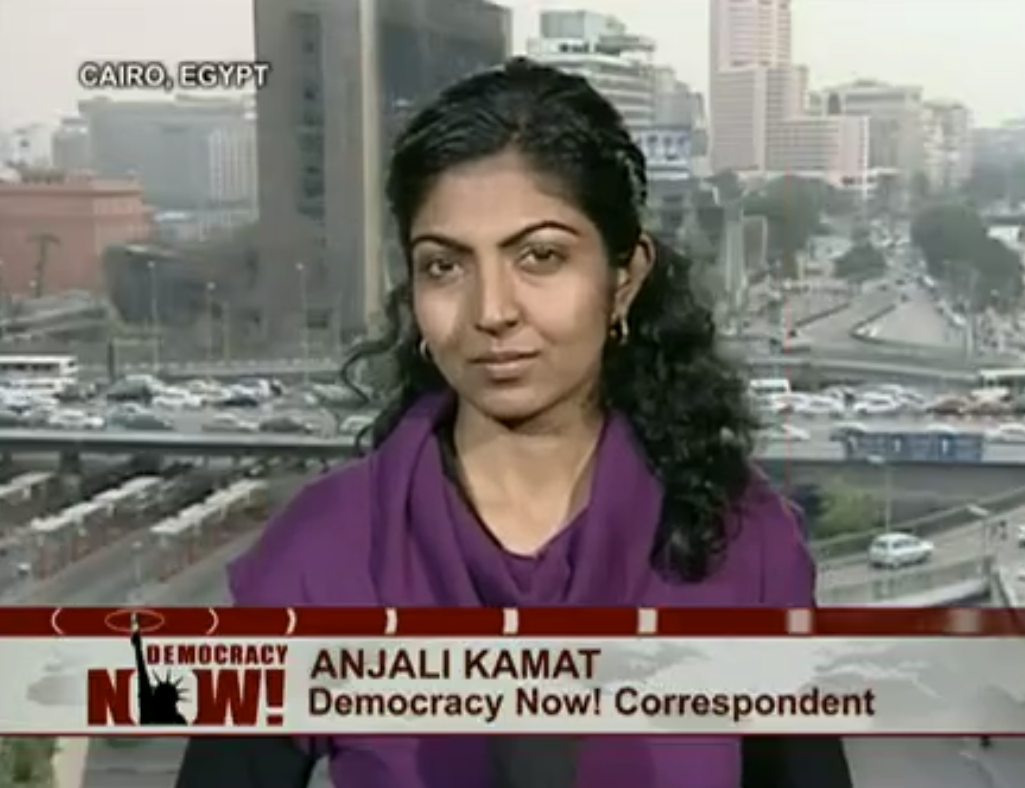
Ugandan scholar Mahmoud Mamdani observed that “what struck me about Anjali’s description [of the situation in Libya] is that the backdrop is missing. The backdrop is the manner of change in Libya, the heavy involvement of external forces in expediting, rapid fashion, change in Libya, and that manner of involvement being basically bombardment. In East Africa, which is where I’ve been for the last eight months, this has been the cause of huge concern, huge concern [particularly over the threat of regime change through external involvement and what this will mean for the rest of Africa].”[27]
In hindsight, it is clear that the U.S. was completing a 40-year regime change operation targeting Colonel Qaddafi for which media disinformation was pivotal.
It is important today as such to revisit the 2011 war so that U.S. citizens can learn from the history and not be duped again into supporting an intervention of this kind.
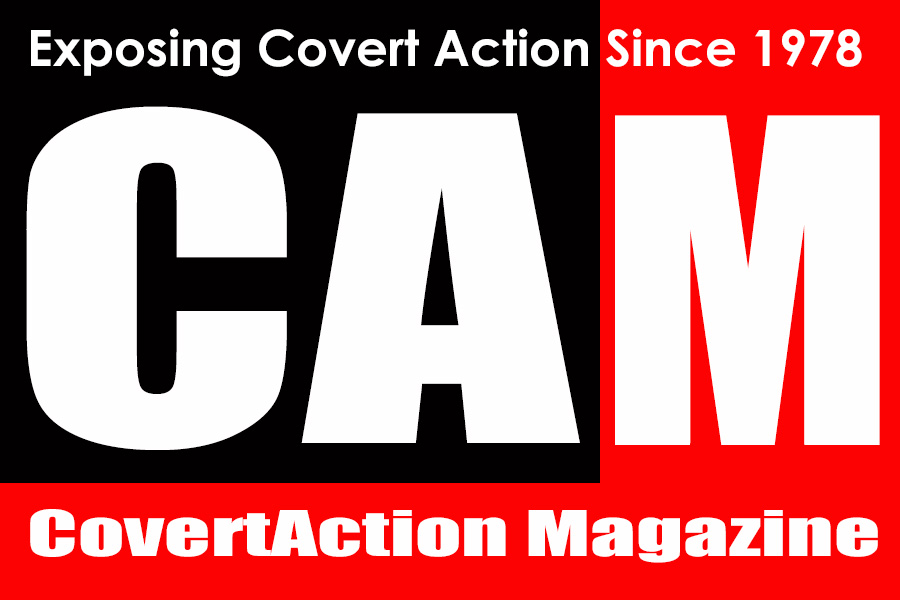
[1] Human Rights Watch, World Report 2020, Libya, https://www.ecoi.net/en/document/2022716.html#:~:text=HRW%20–%20Human%20Rights%20Watch%20World%20Report%202020,group%20known%20as%20the%20Libyan%20National%20Army%20%28LNA%29.
[2] After an alleged meeting between Hiftar and Prince in Cairo on April 15th, 2019, Trump publicly recognized Hiftar’s “significant role in fighting terrorism and securing Libya’s oil resources,” and supported Hiftar’s advance in Tripoli in a shift from previous U.S. backing of the government that Hiftar was trying to topple.
[3] Human Rights Watch, World Report 2020, Libya, https://www.ecoi.net/en/document/2022716.html#:~:text=HRW%20–%20Human%20Rights%20Watch%20World%20Report%202020,group%20known%20as%20the%20Libyan%20National%20Army%20%28LNA%29.
[4] See Peter Hoekstra, Architects of Disaster: The Destruction of Libya (New York: The Calamo Press, 2015), 73; Wayne Madsen, “Dispatches from Tripoli, Libya during the NATO Bombing Campaign of 2011,” in The Illegal War on Libya, ed. Cynthia McKinney (Atlanta: Clarity Press Inc., 2012), 31. Madsen who reported from Libya, emphasized that the protesters were largely Salafists who subscribed to the extremist Wahhabist sect version of Islam promoted by the Saudi Arabian Royal family, United Arab Emirates and Qatari Royal family—all three countries being members of the anti-Qaddafi Arab front supporting the U.S.-NATO attack on Libya.
[5] Jeremy Kuzmarov, Obama’s Unending Wars: Fronting the Foreign Policy of the Permanent Warfare State (Atlanta: Clarity Press Inc., 2019), 121, 122.
[6] Kuzmarov, Obama’s Unending Wars, 126.
[7] Kuzmarov, Obama’s Unending Wars, 120.
[8] Kuzmarov, Obama’s Unending Wars, 120.
[9] The Illegal War on Libya, McKinney, ed.
[10] The Illegal War on Libya, McKinney, ed.
[11] The people’s councils at times criticized Qaddafi and passed measures he opposed. Qaddafi had wanted to abolish capital punishment, for example, and promoted home-schooling over traditional schools but was outvoted on these matters. The people’s councils also rejected a plan by Qaddafi to give oil proceeds directly to each family.
[12] See Maximilian Forte, Slouching Towards Sirte: NATO’s War on Libya and Africa (Montreal: Baraka Books, 2012); Noam Chomsky, Pirates and Emperors: Old and New: International Terrorism in the Real World (Boston: South End Press, 2003).
[13] Bill Schaap, “The Endless Campaign: Disinforming the World on Libya,” CovertAction Information Bulletin, Number 30 (Summer 1988), 76; Bob Wodward, “Ghadafi Target of Secret U.S. Deception Plan,” The Washington Post, October 2, 1986.
[14] See The Illegal War on Libya, McKinney, ed., 253-274.
[15] Sirte, Slouching Towards Sirte; The Illegal War on Libya, McKinney, ed.; Vijay Prashad, Arab Spring, Libyan Winter (Oakland, CA: AK Press, 2012).
[16] “Saif Qaddafi, Speech, February 21, 2011,” in email from Hilary Clinton to Oscar Flores, WikiLeaks Hillary Clinton email archive, https://wikileaks.org/clinton-emails/emailid/24538
[17] Kuzmarov, Obama’s Unending Wars, 126.
[18] Quoted in Kuzmarov, Obama’s Unending Wars, 125.
[19] Kuzmarov, Obama’s Unending Wars, 129.
[20] Kuzmarov, Obama’s Unending Wars, 129.
[21] Kuzmarov, Obama’s Unending Wars, 128, 129.
[22] Forte, Slouching Towards Sirte.
[23] Magarief had been head of the Islamist opposition to Qaddafi in the 1980s and 1990s when he survived various assasination attempts.
[24] See Robert Dreyfuss, Devil’s Game: How the United States Helped to Unleash Fundamentalist Islam (New York: Metropolitan Books, 2005).
[25] Kuzmarov, Obama’s Unending Wars, 132.
[26] Don DeBar, “Radio Pacifica’s Descent: From Voice of the Voiceless to Partner in the Imperial Information War,” in The Illegal War on Libya, McKinney, ed., 166, 171. DeBar notes that, in eight months of coverage, not a single voice was presented on Democracy Now challenging the foundations of the war. Democracy Now’s bias was evident in host Amy Goodman’s characterization of an address by Saif Al-Islam, warning about a civil war in Libya and blaming the violence on Islamic fundamentalists and foreigners, as rambling.
[27] See Bruce Dixon, “Are Democracy Now!’s Libya Correspondents Feeding Us the State Department and Pentagon Line on Libya?” Black Agenda Report, October 5, 2011, https://www.blackagendareport.com/content/are-democracy-nows-libyan-correspondents-feeding-us-state-department-and-pentagon-line-libya
CovertAction Magazine is made possible by subscriptions, orders and donations from readers like you.
Blow the Whistle on U.S. Imperialism
Click the whistle and donate
When you donate to CovertAction Magazine, you are supporting investigative journalism. Your contributions go directly to supporting the development, production, editing, and dissemination of the Magazine.
CovertAction Magazine does not receive corporate or government sponsorship. Yet, we hold a steadfast commitment to providing compensation for writers, editorial and technical support. Your support helps facilitate this compensation as well as increase the caliber of this work.
Please make a donation by clicking on the donate logo above and enter the amount and your credit or debit card information.
CovertAction Institute, Inc. (CAI) is a 501(c)(3) non-profit organization and your gift is tax-deductible for federal income purposes. CAI’s tax-exempt ID number is 87-2461683.
We sincerely thank you for your support.
Disclaimer: The contents of this article are the sole responsibility of the author(s). CovertAction Institute, Inc. (CAI), including its Board of Directors (BD), Editorial Board (EB), Advisory Board (AB), staff, volunteers and its projects (including CovertAction Magazine) are not responsible for any inaccurate or incorrect statement in this article. This article also does not necessarily represent the views the BD, the EB, the AB, staff, volunteers, or any members of its projects.
Differing viewpoints: CAM publishes articles with differing viewpoints in an effort to nurture vibrant debate and thoughtful critical analysis. Feel free to comment on the articles in the comment section and/or send your letters to the Editors, which we will publish in the Letters column.
Copyrighted Material: This web site may contain copyrighted material the use of which has not always been specifically authorized by the copyright owner. As a not-for-profit charitable organization incorporated in the State of New York, we are making such material available in an effort to advance the understanding of humanity’s problems and hopefully to help find solutions for those problems. We believe this constitutes a ‘fair use’ of any such copyrighted material as provided for in section 107 of the US Copyright Law. You can read more about ‘fair use’ and US Copyright Law at the Legal Information Institute of Cornell Law School.
Republishing: CovertAction Magazine (CAM) grants permission to cross-post CAM articles on not-for-profit community internet sites as long as the source is acknowledged together with a hyperlink to the original CovertAction Magazine article. Also, kindly let us know at info@CovertActionMagazine.com. For publication of CAM articles in print or other forms including commercial internet sites, contact: info@CovertActionMagazine.com.
By using this site, you agree to these terms above.
About the Author

Jeremy Kuzmarov holds a Ph.D. in American history from Brandeis University and has taught at numerous colleges across the United States. He is regularly sought out as an expert on U.S. history and politics for radio and TV programs and co-hosts a radio show on New York Public Radio and on Progressive Radio News Network called “Uncontrolled Opposition.”
He is Managing Editor of CovertAction Magazine and is the author of six books on U.S. foreign policy, including Obama’s Unending Wars (Clarity Press, 2019), The Russians Are Coming, Again, with John Marciano (Monthly Review Press, 2018), Warmonger. How Clinton’s Malign Foreign Policy Launched the U.S. Trajectory From Bush II to Biden (Clarity Press, 2023); and with Dan Kovalik, Syria: Anatomy of Regime Change (Baraka Books, 2025).
Besides these books, Kuzmarov has published hundreds of articles and contributed to numerous edited volumes, including one in the prestigious Oxford History of Counterinsurgency .
He can be reached at jkuzmarov2@gmail.com and found on substack here.

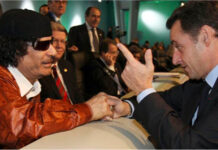
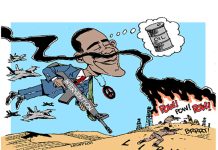

So perfectly stated, Ellen.
[…] on U.S. allies and a U.S. congressman (Dennis Kucinich) who opposed his administration’s illegal invasion of Libya that devastated that country, f) stepped up surveillance and efforts to destroy Wikileaks and its founder Julian Assange, […]
[…] CIA, HSBC, e) bisbilhotou aliados dos EUA e um congressista dos EUA (Dennis Kucinich) que se opôs à invasão ilegal da Líbia por seu governo que devastou naquele país , f) intensificou a vigilância e os esforços para destruir o Wikileaks e seu fundador Julian […]
[…] on U.S. allies and a U.S. congressman (Dennis Kucinich) who opposed his administration’s illegal invasion of Libya that devastated that country, f) stepped up surveillance and efforts to destroy Wikileaks and its founder Julian Assange, and […]
[…] on U.S. allies and a U.S. congressman (Dennis Kucinich) who opposed his administration’s illegal invasion of Libya that devastated that country, f) stepped up surveillance and efforts to destroy Wikileaks and its founder Julian Assange, and […]
[…] on U.S. allies and a U.S. congressman (Dennis Kucinich) who opposed his administration’s illegal invasion of Libya that devastated that country, f) stepped up surveillance and efforts to destroy Wikileaks and its founder Julian Assange, and g) […]
[…] episode I discussed in the article was coverage of NATO’s 2011 bombing of Libya, which was of course universally misleading, sensationalist, and […]
[…] CovertAction (Jeremy Kuzmarov) – On 10th Anniversary of the U.S.-NATO Attack on Libya: Powerful Perpetrators Have Yet To Face Justice […]
[…] Magazine/Revista Ação Encoberta e autor de quatro livros acerca de política externa dos US destacou recentemente, os poderosos perpetradores ocidentais dessa calamidade humana nunca foram […]
[…] Kuzmarov, managing editor of CovertAction Magazine and author of four books on US foreign policy, pointed out recently, the powerful Western perpetrators of this human calamity have never been brought to […]
[…] Kuzmarov, managing editor of CovertAction Magazine and author of four books on US foreign policy, pointed out recently, the powerful Western perpetrators of this human calamity have never been brought to […]
[…] Kuzmarov, managing editor of CovertAction Magazine and author of four books on US foreign policy, pointed out recently, the powerful Western perpetrators of this human calamity have never been brought to […]
This article by Jeremy Kuzmarov, Managing Editor of CovertAction Magazine, contains important details of one of the worst war crimes and crimes against humanity of the 21st Century, that is, the destruction of Libya, all the accomplishments of the Libyan Revolution, and brutal and sadistic murder of its leader, the Great Brother Leader, Muammar Qaddafi. I have reposted it on my web site
http://imperialismandthethirdworld.wordpress.com
After liberating Libya from the yokes of American and Western imperialism and their puppet monarchy of King Idris, among his other great deeds and accomplishments, Brother Leader (that is what he preferred to be called) Muammar Qaddafi had created a new form of democracy in Libya, in which economic democracy was central that ensured jobs or guaranteed income, housing, free education, free healthcare, food, etc. for all Libyans. He also gave political and material support to national liberation and anti-imperialist movements in numerous countries. Under his leadership, Libya developed from one of the poorest and least developed country into one of the most prosperous and developed countries, and Libyans had real and substantial rights that people even in the most developed capitalist and imperialist countries could not even dream of. For some of the details, refer to my 2011 article, “Gadhafi, Libya, counter-revolution, and the imperialist pack of hyenas”, with the following link
https://imperialismandthethirdworld.wordpress.com/…
His extremely gruesome and sadistic murder by the puppets and agents of US and Western imperialism was one of the worst sins and crimes of the 21st Century and the politically progressive part of mankind lost one of its most effective leaders. However, overwhelming majorities of Americans and Europeans were and continue to be not only oblivious, indifferent, and callous about that, but actually supportive of it. That is how much their souls, intellects, and integrity have been eroded under advanced capitalism and imperialism.
One great blunder that Qaddafi had made consisted of his erroneous hopes and judgment of the then US President Barack Obama, just like innumerable others, who were deceived by his hypocritical rhetoric and his black skin color. The great American sociologist and politico-economist writer, Professor James Petras, had seen through that mirage, before and after his election to the presidency. He had described him as the greatest conman in recent history in the following article:
A Historic Moment: The Election of the Greatest Con-Man in Recent History ( http://petras.lahaine.org/?p=1766 )
[…] Democracy Now! gave credence to allegations of black mercenaries, air raids by Qaddafi and other propaganda advanced by the State Department and rebel coalition, while failing to report on Qaddafi’s accomplishments and resistance to AFRICOM, and on the fact that the U.S., Britain and France had sent in military advisers to train anti-Qaddafi forces in advance of the bombing.[26] […]
We came, we saw, he died.
-Hillary Clinton
[…] On 10th Anniversary of the U.S.-NATO Attack on Libya: Powerful Perpetrators Have Yet To Face Justice Covert Action Magazine […]
[…] On 10th Anniversary of the U.S.-NATO Attack on Libya: Powerful Perpetrators Have Yet To Face Justice Covert Action Magazine […]
[…] On 10th Anniversary of the U.S.-NATO Attack on Libya: Powerful Perpetrators Have Yet To Face Justice Covert Action Magazine […]
This is an excellent article about a topic that our corporate media ignores. Amazingly, some key American players are not in prison, but in the Biden administration! Here is a short video that covers this crime:
https://www.youtube.com/watch?v=n5Lh4HUyudk
Casting the three perps as witches is not exactly the best way to convince folks of their guilt. It has kept me from recommending this very important article. I wish you had not begun it with that illustration. An iota of sensitivity to issues of misogyny would have been good.
This article contains a lot of good information. I also like to read Wikipedia for the following reasons and recommend this for people:
Wikipedia describes disputes. Wikipedia does not engage in disputes. A neutral characterization of disputes requires presenting viewpoints with a consistently impartial tone; otherwise articles end up as partisan commentaries even while presenting all relevant points of view. Even where a topic is presented in terms of facts rather than opinions, inappropriate tone can be introduced through the way in which facts are selected, presented, or organized. Neutral articles are written with a tone that provides an unbiased, accurate, and proportionate representation of all positions included in the article.
The tone of Wikipedia articles should be impartial, neither endorsing nor rejecting a particular point of view. Try not to quote directly from participants engaged in a heated dispute; instead, summarize and present the arguments in an impartial tone
The New York Times article on the anniversary of Libya’s destruction titled “Can Libya Put Itself Together Again?” was nauseatingly disingenuous: as if the United States did not cause that destruction in the first place. As you pointed out we’ve been out to get Libya ever since Khaddafi came to power and made a stand for Arab nationalism nd then pan-African solidarity. It’s like the US persecution and harrassment of Cuba, viciously vindictive, and goes on forever.
Khaddafi ruled for 42 years,and tried out lots of different policies to see what worked best, but always with the objective of helping the oppressed nations of Africa who were emerging shakily from colonialism.
He himself,for Libya, paid reparations to Black Africa for enslaving their people in historical times. And he
received reparations from Libya’s own colonizer, Italy. He steadily improved Libyans’ standard of living.
The US, always on the watch to catch him up, cynically took advantage of an Arab Spring flurry, stirring
it up into a bloodthirsty cry of “shooting their own people” and off went the NATO bombs.
Tragic. And to add to the sorrow and shame, the citizens of this country will never know the truth.